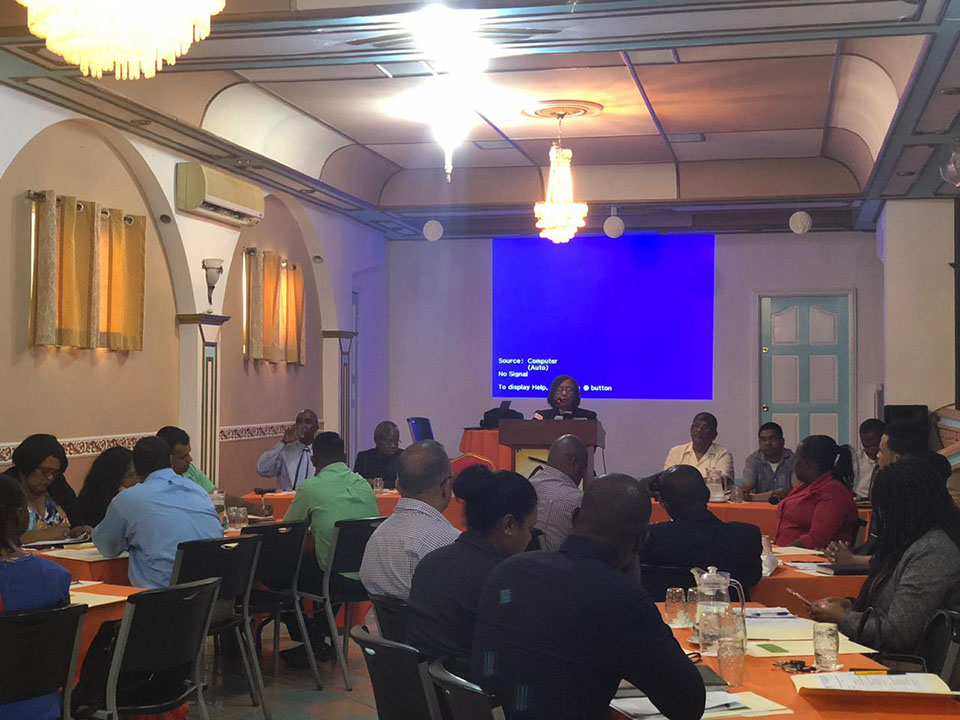Getting the draft regulations for debarment and suspension of contractors approved by the end of the year is still possible, Chairperson of the Public Procurement Commission (PPC) Carol Corbin told a stakeholder engagement yesterday.
The one-day meeting, which was the first in in a series of stakeholders’ engagements on the draft regulations, was hosted by the PPC yesterday at the Regency Suites on Hadfield Street and saw the participation of several national agencies.
Giving the opening remarks, Corbin explained the genesis of the draft regulations, which she had previously said would be at Parliament for approval by the end of the year. “I noted only recently that it was a year ago that the National Procurement and Tender Administration Board (NPTAB) provided a copy of the draft suspension and debarment regulations for its review. I also recalled that in January this year I made a statement to the media that the Commission will take the requisite actions to ensure that these regulations would be approved by parliament by the end of 2018. On reflection, that was a very optimistic revelation on my part but as you listen to my presentation you will agree with me that it still can be achieved,” Corbin said.
She explained that many statements on the debarment of contractors have been made by various government officials over the years as a result of significant problems stemming from the poor execution of government contracts. And despite there being references in the Procurement Act of 2003 to the suspension and debarment of contractors, the required regulations to the process were not included in the legislation.
“For example, Section 17 (2) of the Procurement Act 2003 states that pending the establishment of the Public Procurement Commission, the National Board [NPTAB] shall be responsible for making regulations governing prosecution and carrying out of provisions of the Act and adjudicating debarment procedures,” she said.
“Section 5 (1) refers to the qualification of suppliers and contractors and as part of that it allows acceptance of contractors or suppliers if that contractor or supplier has not been otherwise disqualified pursuant to administrative suspension or debarment proceedings in this or other jurisdictions over the last three years,” Corbin explained further, while adding that even though the Act contained those provisions no action could have been taken to actually debar or suspend any contractor or supplier since the supporting regulations did not exist.
A Public Procurement Organisation and Financial Strengthening Programme was subsequently launched by the Government of Guyana and the Inter-American Development Bank (IDB) and it included the funding of a consultant to review the legal and regulatory framework for procurement.
“As we were advised by the Chairman of the NPTAB, this consultancy was languishing at the Ministry of Finance for a number of years prior to 2014 and was only revamped when that particular Chairman came into office. The Auditor General’s report of 2016 also stated that a consultant was hired to draft regulations under the Procurement Act, setting out procedures to be followed by the PPC in the adjudicated debarment procedures,” she further explained, while stating that the Commission was not involved in the process and only received a draft in 2016.
They reviewed the draft and highlighted that the role and functions of the PPC were not included in the regulations and took it upon themselves to ensure that it reflected the current updated practices and also detailed the functions of the Commission in the process of adjudicating debarment regulations.
She added that it was during that period that they were advised by the NPTAB that a new consultant had been hired to review the Procurement Act and propose possible amendments for the new Act, which needed to include reviewing the existing draft regulations.
“So, even though we had prepared and scheduled actions in terms of revision of the regulations and consequently taken it to [Ministry of] Finance for Parliament, the process was interrupted by this information. We were asked to collaborate with NPTAB and the Ministry of Finance, who were the two parties dedicated to supervise this,” Corbin added.
She said the Commission was asked to collaborate with the two agencies and to make contributions to the final proposal to “what is turning out to be a new Act and also debarment regulations.”
The amended debarment regulations were provided to the new consultant, who reviewed and submitted them for considerations and the final report of the consultancy, which ended in September, will be perceived as the final draft of the debarment regulations.
“I will say in this regard that the PPC is, therefore, back on schedule with its programme, starting with this first set of consultations. So, we feel that our target to have the regulations approved by the end of the year is still a bargain one,” Corbin added.






